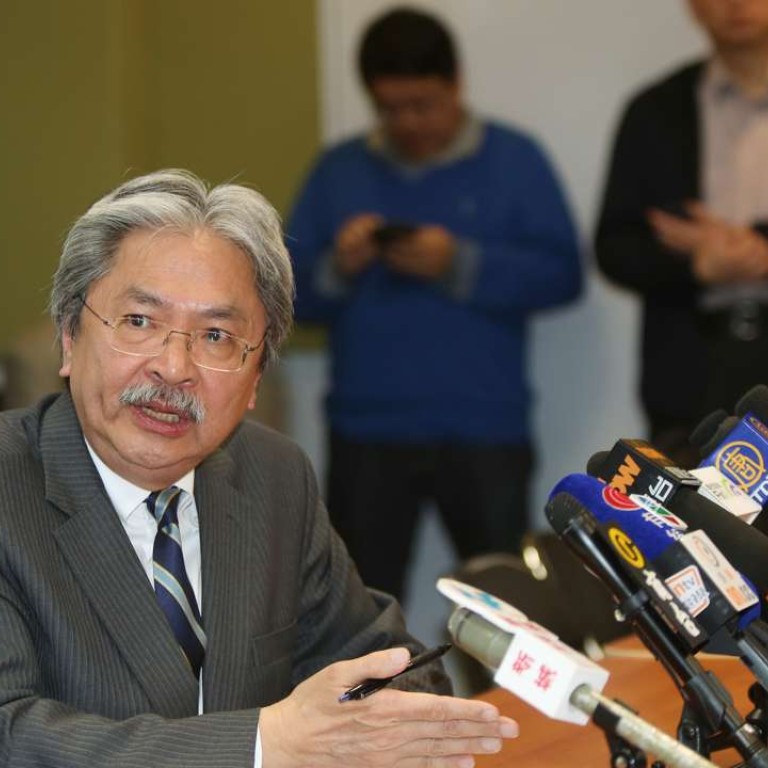
Handshake with Chinese president Xi Jinping among reasons John Tsang decided to run for Hong Kong leadership
Former financial secretary reveals how a brief meeting with president in 2015 was among the reasons he decided to launch bid for HK’s top job
An unexpected handshake from President Xi Jinping in 2015 was among the reasons John Tsang Chun-wah decided to run for chief executive, the former financial secretary revealed on Thursday.
The disclosure came as Tsang and another front runner, former chief secretary Carrie Lam Cheng Yuet-ngor, escalated their veiled attacks on one another ahead of the nomination period for the election race, which is due to start on February 14.
Xi shook Tsang’s hand at an Asian Infrastructure Investment Bank meeting in Beijing in June 2015, which was interpreted by some as a nod for him to become the city’s next leader.
“It was one of the factors but of course that was not all,” said Tsang in a television interview when asked if the handshake had prompted him to run.
Tsang said he had been honoured to receive the offer of a handshake from Xi, describing it as “definitely a good thing”.

In September last year another handshake with Xi at a G20 summit in Hangzhou also got tongues wagging in Hong Kong about whether Xi had given Tsang his backing.
The ex-finance chief is seen as an underdog in the race to secure nominations from members of the 1,200-member Election Committee that will choose the chief executive, as a number of them, along with several chambers of commerce in the city, have signalled their backing for Lam, who is widely believed to have won Beijing’s blessing.
Tsang, who would need the help of pan-democrats to gain the required 150 nominations to enter the race, on Thursday launched a broadside at Lam, whose supporters mostly come from the Beijing-friendly bloc of politicians.
“We are now looking for reconciliation in society,” he said. “Self-reflection might be needed for anyone who only manages to bag support from one end of the spectrum.”
A day earlier, Lam was the one on the offensive when she suggested Tsang had ruined the relationship between the legislative and executive branches of government by not addressing queries from lawmakers in the Legislative Council.
Without naming Tsang directly, the former No 2 official said she had been the one who resolved conflicts between the government and lawmakers when the pair were in office.

She was referring to the saga last December in which Tsang said at a Legco panel meeting that he would not answer questions from four lawmakers who the government had wanted to disqualify from Legco through a judicial review of their oaths of office, citing advice from the Department of Justice.
The government immediately made a U-turn on answering the queries after Tsang’s shock announcement caused a backlash.
Tsang on Thursday said Lam had been informed of the legal advice he received on the matter.
Meanwhile, Lam courted controversy on Thursday after she called on voters to brush off any institutions that might try to intervene in the leadership race, amid concerns that Beijing’s liaison office in Hong Kong had been canvassing votes for her.
“If anyone gets the impression that some institutions are trying to intervene, these people should tell those institutions that they are people with independent thinking and do not need other bodies to change their views,” she told RTHK.
But information technology sector lawmaker Charles Mok argued it should be Lam to stop such meddling.
“How can we believe a chief executive can resist Beijing’s interference when she cannot even stop it in her own election campaign?” he said.
New People’s Party lawmaker Michael Tien Puk-sun, a local delegate to the National People’s Congress, dismissed Lam’s comments as “unrealistic” and said it was impossible for a pro-establishment figure to ignore calls from mainland officials.
The two candidates continued to canvass support on Thursday as they visited the Federation of Trade Unions separately, but both stopped short of promising a law to standardise working hours for employees.
Lam said labour issues needed to be handled carefully or they could sour relations between employers and employees and give rise to social disputes.
Tsang said every trade had its own work requirements and standardising working hours for all trades might not be the best approach. FTU chairman Stanley Ng said the union’s stance was clear but it would look at the election platforms of candidates before deciding who the union would support.
Tsang also met information technology sector voters on Thursday, while Lam successfully invited Joseph Yam Chi-kwong, the former chief executive of the Monetary Authority, to be her campaign’s senior adviser.
Separately, Dennis Kwok, who helped coordinate the 326 pan-democrats who have votes in the upcoming election, said the bloc was more likely to nominate Tsang and another contender, retired judge Woo Kwok-hing, who were both short of nominations.


